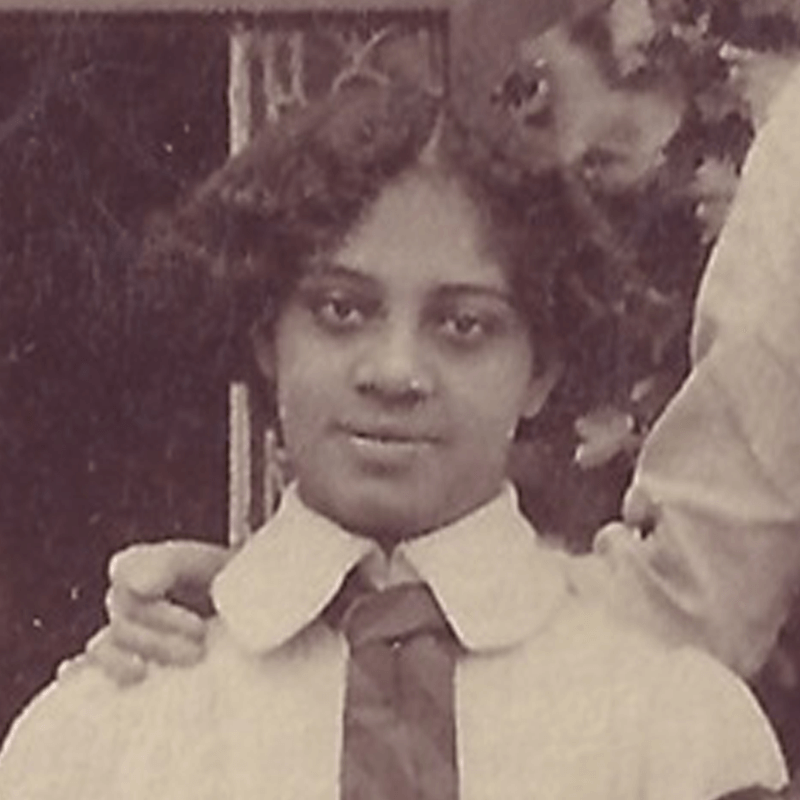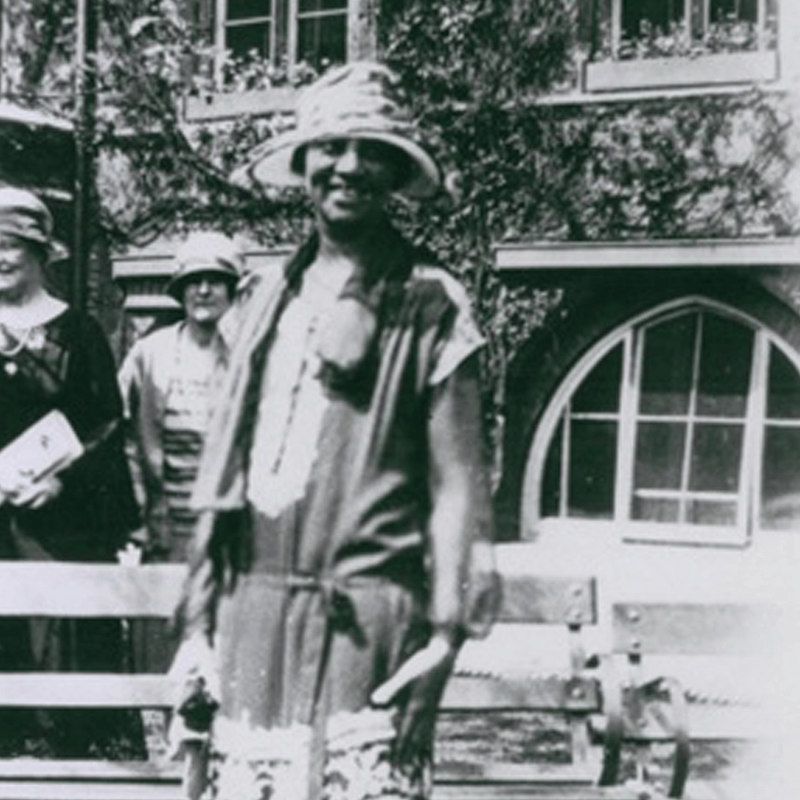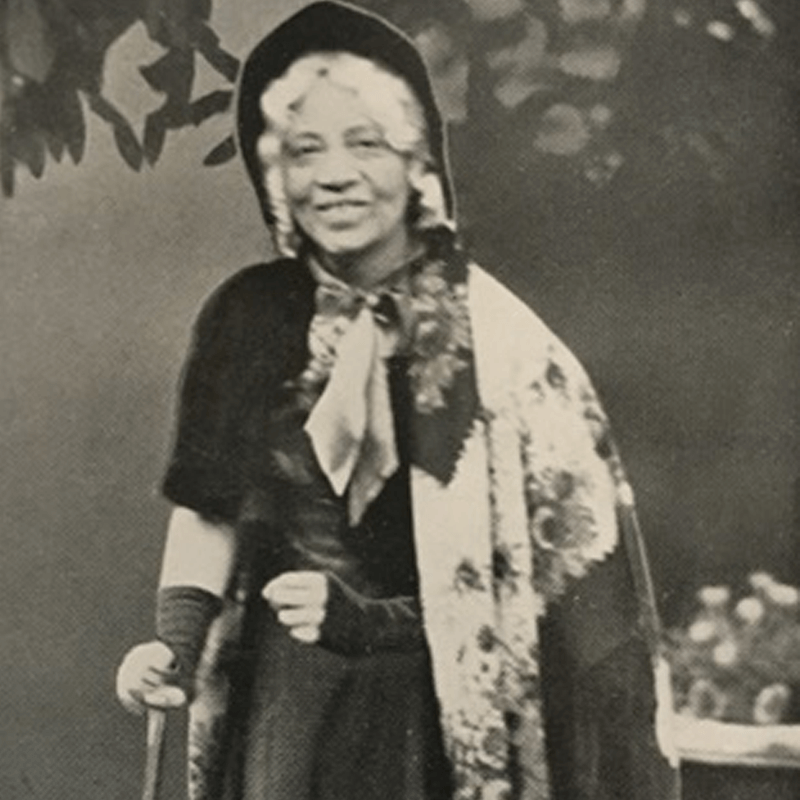Amy Ida Louisa King, Ida, as she called herself, was a lecturer in English at Whitelands College from 1921 until retiring in 1941. She left a very good record of her education and career but far fewer details of her personal journey are known.
She was born in Trinidad, British West Indies in 1881, the daughter of James Howard King, a planter, and Louise Robinson. Initially educated in the Model School, Trinidad and St Mary’s Convent, Barbados; in 1900 she travelled to England to prepare for university entrance at Sunny Hill Girls’ School, Bruton, Somerset. In 1903, aged 22, she was awarded a place at Girton College, Cambridge to study Medieval and Modern Languages – likely the first Black woman, or one of the first, to study at Cambridge. Girton College Archives hold very little information on Ida but do have a photograph of her in her year group, the only Black student.
Jane Liddell-King, Ida’s great niece, who only discovered the connection in 1996, writes about her: ‘A poor examinee, Ida took a third in the Tripos. And, as a woman, she was not admitted to a university degree, but awarded a college certificate. Her certificate, however, enabled Ida to become professional, independent, modern.’
After graduating Ida started her career in teaching; she taught English and French but also produced plays and pageants in schools and local communities. She taught at Heathfield School, Ilkley (I906–I3), Central Secondary School, Sheffield (I9I3), Stafford High School (I9I4–l5), and Burlington School, Piccadilly (I9I6–20). During the academic year 1920 – 21 she lectured for the London County Council as well as coaching for Girton and Newnham scholarships. But her heart was set on London.
In 1921 she joined Whitelands College in Chelsea taking the place of Miss Gurner as lecturer in English and English Literature. The 1922 Whitelands Annual noted ‘Miss King teaches voice production and takes a great interest in the dramatic work’. The domestic bursar at the time meanwhile recorded in her memoirs: ‘She has the most beautifully modulated speaking voice … Her brilliant brain is, I’m afraid, probably beyond my powers to attain – though she has touched me, as well as our girls, indeed everyone in her orbit, with her determination to widen our knowledge of literature and philosophy.’
Inevitably, as Jane Liddell-King writes, Ida’s arrival at Whitelands provoked comment ‘from those who could not have known that both her parents were Black nor that the Caribbean gene pool inevitably includes European DNA.’ One student noted that ‘some of the students were prejudiced and disliked Miss King but I found her most stimulating and unusual.’ In fact, Ida became a very popular member of staff and the Annuals are full of anecdotes about ‘Miss King’ and her productions. Marjorie Coppen (1925) captures Ida’s time at Whitelands thus:
‘”Diaphragm in! On the breath! Up the scale, oo-ah, oo-ah!” These and other queer noises used to come from Miss King’s tiny basement room in old Whitelands at Chelsea. Little urchins from the King’s Road, would shout rude remarks at us down the grating, as Miss King strove to improve our speech with the special lessons, in small groups.
I remember an epic production of “The Lay of the Last Minstrel” in 1924, in which nearly every junior student took part. The English archers wearing green college blazers, and Scottish soldiers, draped in plaid blankets, fought to the death. Miss King was a pioneer in drama in the schools. “Let the children act a play, and let everyone have a part!”.
In 1928, Miss King formed the Old Whitelanders’ Dramatic Society, and called it “Quince’s Players”, and it flourished under her inspiring direction for over eight years.’
Jane Liddell-King continues: ‘As a teacher of teachers, Ida was rigorous, professional and passionate. She was also memorably kind, often distributing chocolates in class and inviting students to tea in her book-lined Putney flat. For 20 years, Whitelands gave Ida scope to explore her own gifts and to nurture talent in others. After retirement, she helped girls in a remand home and coached neighbourhood children. Always interested in people of all nationalities and creeds, she also worked to help refugees, even after a disabling accident. Well into her eighties, she presented herself to the world as a well-dressed, elegant woman of education and culture.’
Ida retired in 1941 and the Whitelands Annual reported, ‘Miss King retired in July after a long period of devoted service to the College. Miss King’s energy never failed and to many it came as a great surprise that she was retiring. Many past students will look back with gratitude to the inspiration, which she gave them in literature and in dramatic work, and Quince’s Players especially will remember her work on their behalf. Miss King is too full of vigour to rest quietly in retirement and we shall expect to hear of her making very active use of her leisure. The good wishes of many “years” of Whitelanders go with her.’
Miss King was always busy; whilst at Whitelands she continued to run drama with groups in poorer parts of London. After her retirement she became a part–time lecturer at Homerton College, Cambridge (I94I–42) and during the war gave lectures to teachers for the London County Council. Her publications included: Translation of the metrical Genesis (for Univ. Extension lectures) (Helmsley, Ilkley I909); Dramatic readers for infants (Pitman I939); Dramatic readers for juniors (Pitman); New plays for boys and girls (Evans I936); The approach to literature (Pitman I93I); ‘Through rhythm to poetry’ (articles in Teachers’ World). She joined the Middle Temple, Inns of Court, in 1944.
The 1959 newsletter of the Whitelands notes Ida’s own letter detailing her recent activities:
'MISS KING writes: "After Cambridge where Whitelands had found a refuge during the war I forged ahead and began exciting projects involving various forms of activity". She then goes on to speak of so many and such varied activities that one is left gasping. They seem to include a number of Youth Clubs, from a Jewish Centre in the Commercial Road to one in a Church of England Home in Putney. She also speaks of a five-year free French experiment, coaching for a scene in a pageant in the Albert Hall, and ends with "my last instance of forging ahead: the public performance of Keighley's Long Mirror which raised £21 for the Southfields branch of the Conservative Association. Old Whitelanders were the stars." '
After Ida died in October 1968 aged 88, the Whitelands Annual was filled with generous tributes; ‘Miss King is dead. Her beautiful voice, her vibrant personality, her generous heart and her brilliant brain are lost to us forever, but we who knew her will never forget the debt which we and Whitelands owe to her.’….
You can discover more about this fascinating woman here:
https://issuu.com/girtoncollege/docs/the_year_2018-19_final_sc/s/156776
https://www.youtube.com/watch?v=_0HHoUnhDR0
and in the Whitelands College Archives https://calmview.roehampton.ac.uk/
This article is adapted from that written by Gilly King as History and Heritage Advisor for Roehampton University during Black History Month in 2016, and with thanks to Jane Liddell-King, author and poet.
Pictures
Amy Ida Louisa King, Girton College Cambridge, 1903
By permission of The Mistress and Fellows, Girton College, Cambridge

Miss King at May Day 1928

Miss King in ‘The Old Curiosity Shop’ 1938

